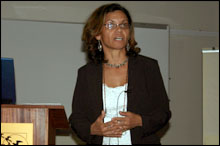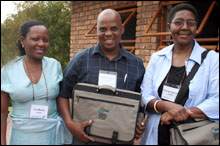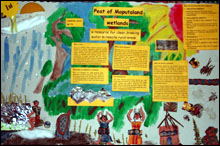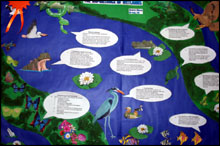Education Outreach
|
Education Outreach features prominently on the Summit agenda
- Sibongile Mokoena, Education Outreach Coordinator, SAEON
Facing the challenge of taking its rightful place in an environment traditionally known to focus exclusively on core science, SAEON's Education Outreach Programme featured prominently on the Summit agenda.
During the plenary session Beverley Damonse, Executive Director of the South African Agency for Science and Technology Advancement (SAASTA) presented the review paper on extra-curricular high school science education programmes and monitoring. Beverley highlighted the importance of capacity building through teacher-support programmes and the need to create a pool of future scientists. Her bold and no-excuses attitude was a fresh approach that was well received by the audience.
In planning the education outreach participation in the Summit, the Network of Education Experts, an advisory committee to SAEON's Education Outreach Programme, suggested that the review paper be accompanied by a current case study in science education outreach. Kirsten Mahood, Education Outreach Coordinator at the DST- NRF Centre of Excellence for Invasion Biology at the University of Stellenbosch, was recommended. Her case study of the Iimbovane (Ants) Monitoring programme captured the audience's attention. The case study clearly demonstrated how environmental monitoring can be integrated into the curriculum by providing a hands-on experience and exposing teachers and learners to environmental monitoring skills.
The positive interaction and input from delegates at the SAEON Summit has shown that education is a subject close to many science-minded hearts.
Poster exhibition
Although the initial plan was to exhibit postgraduate research projects only, the Education Outreach team seized the opportunity to display school environmental projects. Four posters by learners from Vuxeni High School, supported by the SAEON Ndlovu Node were on display. The winning posters from this year's 'Wetlands and Livelihoods' competition for learners, organised by the Agricultural Research Council (ARC) were also exhibited.
The school projects are an indication of the level of effort made by organisations to promote awareness and provide opportunities to involve schools in environmental issues. The quality of the learners' work reflected the level of understanding of environmental issues by the young people. Teachers are encouraged to be the driving force behind these outreach initiatives. This reinforces the importance placed on ongoing support programmes for teachers in SAEON's Education Outreach programmes.
Parallel workshop session
In planning the workshop, the structure, content, speakers and intended outcomes all had to be mapped out. Initially the main challenge was to attract participants from a presumably strictly science-oriented community to the Science Education Workshop. Fifteen delegates attended on the day; a good 12% turn-out.
The challenges and opportunities for capacity building and community involvement were running themes in this session. It was agreed that community Education Outreach is a crucial part of taking science to society but needs to be approached with sensitivity and honesty.
The workshop evaluation shows that on an ascending scale from one to 5, the average success of the workshop was rated 5. The average success of the Education Poster session was rated 4. It was apparent that the delegates all benefited from the sessions.
Graduate Students Network Workshop
A presentation of SAEON's Education Outreach Programme was well received at the Graduate Students' Network Workshop.
The issue that generated a lively debate was about attracting young people to careers in the sciences. The following concerns were raised:
- Lack of awareness about careers in the sciences, e.g. microbiology
- The science community is not visible to the broader community
- The scientists are uneasy about interacting with society. They fear their research objectives may not be understood
- Society has its own, perhaps outdated, perceptions about scientists
and the role of science in their everyday lives
Challenges
The challenge is to develop Science Education Outreach programmes to address the identified gaps. SAEON's and other Science Education support programmes operate outside the formal education system; thus have the challenge to aggressively demonstrate their worth to stakeholders in this sector.
Outcomes
The importance of taking science to society was demonstrated throughout the Summit. One of the important outcomes of the Summit is the collaboration and networking evident in the entire programme. The positive interaction and input from delegates at the Summit has shown that education is a subject close to many science-minded hearts. The scientists present strongly voiced their commitment to contributing to Science Education Outreach Programmes.














